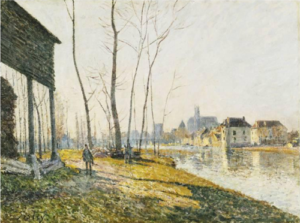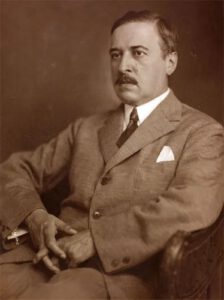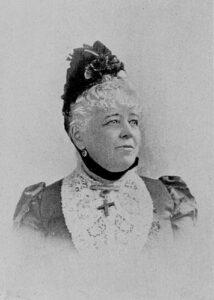De Nederlandse schrijfster Marijke Schermer werd op 25 februari 1975 geboren in Amsterdam. Zie ook alle tags voor Marijke Schermer op dit blog.
Uit: Noodweer
“Nemen we jouw auto?’
‘We zijn veel te laat.’
Haar man komt uit de keuken. Hij is lang, mager en zijn gezicht is uitgesproken knap. Hij heeft een zwierig pak aan. De pan in zijn handen en de theedoek over zijn schouder verraden toewijding. Hij zet de pan op tafel, werpt de lap terug in de richting van het aanrecht dat hij net niet haalt. Leo lacht met een hoog en helder stemmetje. Alicia, het buurmeisje dat oppast, knoopt Osip een slabbetje om. Ze is in een paar weken tijd van een androgyn kind in een kermisattractie veranderd. Haar wangen en lippen zijn rood geverfd, ze draagt idiote, veel te blote kleren. Emilia moet zich bedwingen haar niet ook over haar bol te aaien. Ze kussen de kinderen gedag.
‘Jij rijdt. We gaan het halen.’
Ze scheurt de oprijlaan af en draait de weg op. Het eerste deel van de rit voert over de dijk, door de glooiende rivierdelta, over een smalle tweebaansweg tussen de populieren. Er is een zakkend zomers zonnetje met weinig kracht en er staat een flinke wind. In de weilanden rechts van hen staan schapen. Even later, op de snelweg, kan ze echt hard rijden, iets wat ze graag doet. Ze praten niet veel. Door het raam waait een herinnering binnen aan lange tochten naar het zuiden, blote benen uit het raam, zingend. Vlak voor Amsterdam voeren ze een korte discussie over de beste route naar het Leidseplein.
‘Waarschijnlijk heb jij gelijk,’ zegt ze terwijl ze haar eigen idee ten uitvoer brengt. Ze gokt op een vrije plek, gokt goed en parkeert vlak bij het theater. Ze besluiten dat betalen precies de tijd kost die ze niet meer hebben. Ze rennen, steken over, worden rakelings gepasseerd door een fietser. Bruch roept dat ze de volgende keer een hotel moeten nemen; even worden ze gegrepen door de wens te worden opgeslokt door het leven in de stad, in plaats van straks en ongetwijfeld weer met haast, terug te moeten keren naar de stilte.Ze rennen de schouwburg in, de trap op naar de zaal, waar zij als laatsten arriveren voor de deuren rondom sluiten. Hij vouwt hun jassen in elkaar onder zijn stoel en knijpt haar in haar zij.”

Marijke Schermer (Amsterdam, 25 februari 1975)
De Duitse jezuïet en dichter Friedrich von Spee werd op 25 februari 1591 in Kaiserswerth bij Düsseldorf geboren. Zie ook alle tags voor Friedrich von Spee op dit blog.
Kom tot ons, scheur de hemelen, Heer
Kom tot ons, scheur de hemelen, Heer,
daal, Heiland, uit uw hemel neer.
Ruk open, rijt ze uit het slot,
de hemeldeuren, Zoon van God.
Dauwt, hemelen, schenkt u maatloos uit,
daal, Heer, als dauw op dorstig kruid.
Gij wolken, breek in regens neer,
regen de Heiland, Israëls Heer.
Breek, aarde, uit, breek uit in pracht,
dat berg en dal van lente lacht.
O aarde, wek die roze rood,
ontspring, Heer, aan der aarde schoot.
Waar blijft Gij toch, o ’s werelds troost,
die wij verbeiden onverpoosd?
O daal toch uit uw hoog paleis
in ons verloren paradijs.
Gij klare zon, gij schone ster,
door ons aanschouwd van eindloos ver,
o zon ga op, o zonneschijn,
laat ons niet in het donker zijn.
Wij zijn hier in zo grote nood,
wij leven allen naar de dood.
O kom, en voer met sterke hand
ons weer terug in ’t vaderland.
Vertaald door Ad den Besten
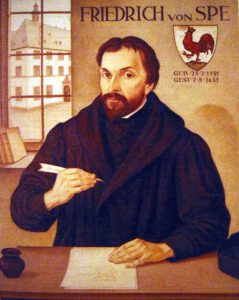
Friedrich von Spee (25 februari 1591 – 7 augustus 1635)
Portret door Martin Mengen, 1938
De Amerikaanse dichteres en schrijfster Jane Goodwin Austin werd geboren in Worcester, Massachusetts, op 25 februari 1831. Zie ook alle tags voor Jane Goodwin Austin op dit blog.
Uit: Betty Alden
“As she spoke, the merry gleam died out of the captain’s eyes, and grasping his beard in the left hand, as was his wont in perplexity, he said gravely,—
“These are large matters for a woman’s handling, Priscilla, and it may chance that Barbara’s silence is the better part of your valor. But still,—what do you mean?”
“I mean that Master Oldhame and Master Lyford as the head, and their followers and creatures as the tail, are maturing into a very pretty monster here in our midst, which if let alone will some fine morning swallow the colony for its breakfast, and if only it would be content with the men I would say grace for it, but, unfortunately, the women and children are the tender bits, and will serve as a relish to the coarser meat.”
“Come, now, Priscilla, a truce to your quips and jibes, and tell me what there is to tell. I cry you pardon for noting your forwardness in what concerned you not”—
“Nay, Myles, you’ve said it now,” interposed Barbara, with a little laugh, while Priscilla, gathering her work in her apron, and looking very pretty with her flaming cheeks and sparkling eyes, jumped up saying,—
“At all events, John Alden’s dinner concerns both him and me, and I will go and make it ready; a nod is as good as a wink to a blind horse, and a penny pipe as well as a trumpet to warn a deaf man that the enemy is upon him. Put your nose in the air, Captain Standish, and march stoutly on into the pitfall dug for your feet.”
“Come, come, Mistress Alden! These are no words for a gentlewoman,” began the captain angrily, but on the threshold Priscilla turned, a saucy laugh flashing through the anger of her face, and reminding the captain in his own despite of a sudden sunbeam glinting across dark Manomet in the midst of a thunder-storm.
“Here’s the governor coming up the hill, Myles,” whispered she, “and you may finish the rest of your scolding to him. I’m frighted as much as is safe for me a’ready.”
And light as a bird she ran down the hill just as Bradford reached the door and, glancing in, said in his sonorous and benevolent voice, “Good-morrow to you, Mistress Standish. I am sorry to have frighted away your merry gossip, but I am seeking the goodman— Ah, there you are, Captain! I would have a word with you at your leisure.”
“Shall I run after Priscilla, Myles?” asked Barbara, cordially returning the governor’s greeting.”
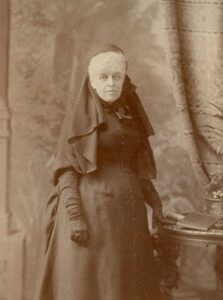
Jane Goodwin Austin (25 februari 1831 – 30 maart 1894)
Zie voor nog meer schrijvers van de 25e februari ook mijn blog van 25 februari 2024 en ook mijn blog van 25 februari 2019 en ook mijn blog van 25 februari 2018 deel 2 en eveneens deel 3.

